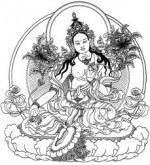A calming conversation

His Eminence Garchen Triptul Rinpoche – a Buddhist from Tibet – visited the Wah Lum Kung Fu School to give a public talk Saturday on the topic of loving kindness.
Rinpoche’s talk coincided with Martin Luther King Jr. Day. King was known for spreading a message similar to Rinpoche of love, kindness and selfless sharing.
“I think that it is really great that, this weekend in Tampa, there are a lot of positive things happening,” said Siri Nelson, an event attendee and student at Hillsborough Community College. “If you are not thinking about MLK Jr. personally when you receive a teaching on loving kindness, you are inheriting MLK Jr. into your life whether you want to name it or not.
“Maybe some people that are not necessarily interested in recognizing this holiday or maybe just don’t have it in their mind are still getting that teaching, which is definitely a teaching that supports peace, harmony and equality.”
The event, hosted by the local Ratnashri Sangha, took place in what appeared be a refurbished warehouse. The environment for the talk was very relaxed, as Rinpoche sat cross-legged on a seat adorned with colorful red and gold cloths. His disciples, Lama Bunima and Lama Abao, accompanied him. Rinpoche did not speak in English, so Megan Howard translated his words to the attendees.
“All suffering comes from ignorance. What is ignorance? It is self-grasping. It is the thought of me, I,” Rinpoche said.
He went on to explain that when one thinks in terms of me and I, that person is forming a separation from others. This creates a dichotomy between that person and the rest of the world; everyone faces suffering together. According to Buddhist teachings, there is no separation between self and other.
Rinpoche also discussed how all beings could free themselves from suffering.”If we want to be free from suffering, how do we do that? The only way is to get rid of our self-grasping,” Rinpoche said. “If we cannot get rid of our self-grasping, we will never be free from suffering.”
Regardless of whether one identifies with Buddhism, the attributes of leading a life based on loving kindness can be applied and viewed universally.
“In general, the teachings of love and kindness have been supplemented for me through Buddhism, and for which Buddhism has provided a language for in my life,” Nelson said. “I think that the love and kindness aspect is very important for cultivating patience, and in my life, recognizing when I need to take a step back from strong emotions or strong experiences and situations, having compassion for other people, practicing compassion for other people and also knowing the variant definitions of compassion and compassionate action and right action.”
Rinpoche also provided examples of how to practically apply his teachings.
“If we engage in generosity for the wrong reasons – if we think, ‘I’m going to give, I will give this, so in the future I will become rich,’ or for some people, ‘I will give this because I want something in return,'” it is important for one to realize that the true nature of giving is one where there are no expectations of receiving anything in return and thusly is lacking in self-grasping, Rinpoche said.
One such example Riponche spoke about regarded the way in which people who have the privilege of claiming food as their own often refer to it as “my food.” Rinpoche said one must recognize that to eliminate self-grasping, one must eliminate such false ideas of “I” and “my.” By doing so, one eliminates ownership.
Through meditation and honest inquiry, Rinpoche said people can begin to lead a life in which loving kindness is present. He provided the community with a way to reflect on the teachings of loving kindness that Buddha, King and many others have provided and continue to provide for all of us.






